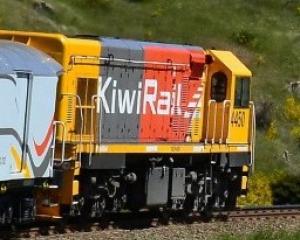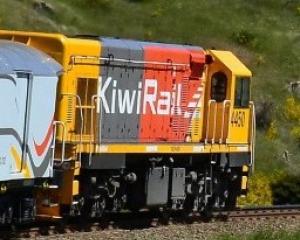"Economic man" may be rational, but this doesn't always make him right, argues Harry Love.
It is an unfortunate but persistent truth that economic man, that quintessence of rational thought and action (or inaction), invariably assumes that any argument opposing his own must be emotional, and therefore flawed.
Thus Stephen Joyce, in his attempt to refute the arguments of Phil Goff and others for the building of new trains at the Hillside workshops (ODT 13.5.10).
Let us, then, without emotion, look at his argument for traces of passion or prejudice which might contaminate the purity of his logic.
The last Government, observes Mr Joyce, paid $600 million for Kiwirail, which is now valued at $388 million.
Clearly, on the numbers alone, this appears irrational, and "that sort of waste costs jobs".
Of course, if a Government were a business such a deal might well be beyond the bounds of reason and result in bankruptcy and loss of jobs.
However, the background to this irrational act is a little more complex than the logic of mere passionless numbers.
Had the last Government not intervened we could well have no rail network at all.
In the broader context and the longer term, one could well argue, rationally, that the disappearance of such infrastructure could have had an even higher cost in both money and jobs.
If the last Government was held to ransom by a rapacious corporation acting in its own rational self-interest, that is because earlier Governments behaved irrationally in allowing their prejudice for privatisation to give this valuable asset to other private corporations who, in their narrow, but still rational, self-interest asset-stripped it until it was barely functional.
Secondly, the Berl report that advocates investment in building rolling stock is, according to Mr Joyce, flawed.
This I cannot rationally contest because I haven't read it, so I'll take his word for it.
Has one ever met an economist who wasn't flawed?However, flawed though the report may be in terms of a business case for the kind of returns a private business might reasonably expect, the premise that long-term investment in the skills, plant and machinery to manufacture and maintain a vital element of infrastructure has not been refuted.
Or perhaps Mr Joyce does not think that rail is a vital element in the nation's infrastructure.
If that is the case, he should say so and show us what his more cost-effective alternatives are.
Thirdly, he accuses members of the last Government of hypocrisy for not, when given the opportunity, building trains in New Zealand for Wellington, while advocating the opposite now.
A fair cop.
But one can hardly argue rationally that because the other side once did something stupid, so should we.
This particular argument seems to be coloured less by logic and any analysis of the question than the need to score a point.
Then, as is invariably the case with such Olympian rhetoric, we are patronised with a rather bizarre and irrational analogy.
Hillside workshops are apparently full of great Kiwis, all brimful with great Kiwi ingenuity and, we are assured, "given a reasonable opportunity I'd back a Kiwi every time".
But, like our great Kiwi rugby players, they should stick to what they are good at and not try to play gridiron.
But no-one is asking the Hillside men to build aeroplanes, or the All Blacks to play gridiron, merely to enhance the expertise they have in building trains, as their sporting equivalents might branch out a bit and enhance their ball-chasing skills while still playing something that resembles rugby.
As these great Kiwis are not going to get an opportunity to demonstrate their Kiwi ingenuity, one could reasonably conclude that his enthusiasm for their talents, like his enthusiasm for numbers, is rather abstract, not to say hollow.
While sticking to your knitting may, in many respects, be good advice, it should be leavened with a little understanding of what the knitting is, and what it's meant to achieve.
And this is where Mr Joyce's intense focus on the short-term business case gets a bit scary.
A couple of weekends ago, on Radio NZ, Mr Joyce revealed to us that China, and some other countries, are good at making trains, while New Zealand is good at producing milk, and that's the way the world is.
But once upon a time China was not very good at making trains and, so we are informed, they're getting better at producing milk (as are others in South America, Eastern Europe, etc).
It's hard to believe that he is seriously telling us that we shouldn't broaden and shore up our manufacturing base, even if on a more humble scale than more populous countries can achieve in any one area, and that we should produce yet more milk to pay others to do what we could do ourselves if we had the will to do it.
The world changes and if we wish to take advantage of those changes we actually have to do something.
I have no doubt that Mr Joyce would confess to being passionate about the rational governance of our fair nation.
Perhaps the language is just more complicated than we thought.
Harry Love lives in Dunedin.




